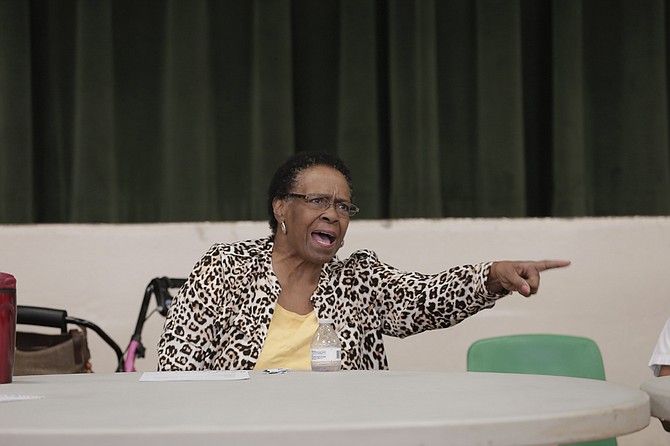Brenda Travis, who was expelled from her McComb, Miss., high school in 1961 for protesting for civil rights, speaks out about the importance of education. Photo by Imani Khayyam.
MCCOMB, Miss.—Summit Town Councilman Joe Lewis said that when Brenda Travis was expelled from Burglund High School on Oct. 4, 1961, it took his classmates minutes—"not days or weeks"—to decide they would protest.
"You almost got us in trouble!" said Bob Zellner, a lifelong activist who had served during that time on the Student Nonviolent Coordinating Committee.
The school district's all-white school board expelled Travis, then 16, and a handful of her classmates after her summertime arrest for conducting sit-ins at the local Woolworth and Greyhound station on that day in 1961. Travis spent time in juvenile detention, then attempted to re-enroll in school and learned that she had been expelled—and also kicked out of Mississippi as a condition of her parole. She left for a year, returning illegally to McComb in 1962.
More than 130 of Travis' classmates walked out and knelt to pray at McComb City Hall to protest the injustice, where they were arrested and then packed into jail cells. Several students, whose mothers and fathers worked as sharecroppers and lived on plantations, found their parents' livelihoods threatened for their participation in the protest. Plantation owners would fire the parents, or threaten to fire them, unless they signed pledges to no longer participate in civil-rights activities. Officers baited the students with the pledges, saying their signatures would ensure their early release. Students who failed to sign also faced expulsion.
McComb citizens and civil-rights veterans gathered to celebrate the 55th anniversary of the event this past weekend, hosted by the Brenda Travis Historical Education Foundation, an endeavor that stresses the importance of civil rights literacy and academic achievement for students of all ages. The dialogue-heavy weekend urged participants to speak out about how the Civil Rights Movement affected them and their lives, and gave workshops on how to identify, learn about and tackle racism.
Much of the conversation veered back to the importance of education. Many of the expelled citizens went on to study at the now-closed Campbell College in Jackson, and others studied with civil-rights leader Bob Moses at the Masonic temple in town to continue their high school education. But there was still initial worry about how they would attend school. Their expulsions meant they could attend no other public schools in the state of Mississippi.
Hilda Casin, a retired McComb educator and curator of the Black History Gallery in the town, stressed what a sacrifice it was for students to risk expulsion.
"Schools are there to educate you. Let you know what your rights are, and what you're entitled to," Casin said.
Travis, who splits her time between Mississippi and California, said that black young people hurt themselves when they do not apply the full scope of their abilities to doing well in school, and hopes that parents and educators take more seriously the necessary the task of teaching civil rights to youth of all races.
Read more about the Burglund High School walkout here.
Sierra Mannie is an education-reporting fellow for the Jackson Free Press and The Hechinger Report. Email her at [email protected].
More stories by this author
- Minding the Equity Gap: How Majority-Black Clinton District Earns Its ‘A’ Rating
- Beyond Blame: JPS Works to Avoid State Takeover of Local Schools
- Facing Takeover, JPS Corrective Action Gains Urgency
- Licensing Mississippi’s Teachers: A Shift in Control?
- Takeover of JPS Looms as District Addresses Probation, Audit



Comments
Use the comment form below to begin a discussion about this content.
comments powered by Disqus